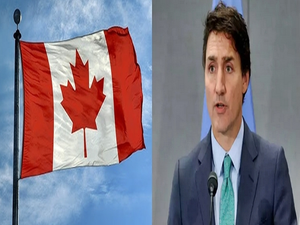America
Third No-Confidence Motion Against Trudeau Government Fails.

December 10:
In Canada, the minority Liberal government was bailed out by Jagmeet Singh's New Democratic Party on December 9th, marking the third consecutive no-confidence motion.Members of the Green Party and the New Democratic Party voted against the resolution when it came up for vote, guaranteeing that the Liberals would remain in power.
In September 2024, at the beginning of the House of Commons session, NDP leader Jagmeet Singh announced that he had severed the confidence and supply agreement with the Liberal government. The deal was to back the Liberals until the following year.
No confidence in the government was requested in the most recent Conservative no-confidence motion, which cited criticism of the Liberals by NDP leader Jagmeet Singh over labor issues and urged the House to concur with Singh's stance.
The Liberal government's demise was announced last week by Jagmeet Singh, who stated that he would not back Poilievre's efforts.
On the afternoon of December 9th, when NDP lawmakers voted against the motion—and Jagmeet Singh, who was not present in the house at the time of the confidence vote, voted remotely—the Conservative benches jeered.
Since that is what the Conservatives are doing, we will not vote to support any of their games. To reporters, Singh declared, "They're playing games" following the tallying of votes.
Voting against the Conservatives' no-confidence motions gave the Liberals a much-needed reprieve; the New Democratic Party (NDP) has 25 members in the House of Commons and is the fourth largest party there after the Liberals, the Conservatives, and Bloc Quebecois.
A New Democratic opposition resolution demanding the government's permanent removal of GST from what the party refers to as basics was also voted on in the House.
In addition, the resolution urged the Liberals to broaden the eligibility of their proposed $250 (US$176.32) "working Canadians rebate" to cover more vulnerable persons, such as seniors who have retired and those who depend on disability benefits. If the necessary legislation is passed, those funds are anticipated to be disbursed this spring.
Only the New Democratic Party and the Green Party voted in support of this resolution, which led to its loss. Only Liberal MP Chad Collins voted in favour of the NDP resolution. On the eve of the holiday season, the Liberals wanted a unique package that combined the refund with the federal sales tax holiday. However, the NDP stated it would not support the rebate unless it was increased, so the Liberals were compelled to present the GST proposal in a separate bill.
To become law, the Liberals require the backing of one of the three main opposition parties in the House of Commons. But Jagmeet Singh indicated he was willing to negotiate.
I would prefer it if it were better. It needs improvement, but we're pretty flexible about how that's done. According to Singh, it should be made available to everyone, including seniors, persons with impairments, and mothers attempting to raise their children.
All working Canadians with a last-year salary of less than 150,000 Canadian Dollars (US$1,05,790.62) would be eligible to receive the payments. About 18.7 million people and about $4.7 billion (or $3.31 billion) worth of money would be involved, according to the government's estimations.
The Conservatives have chosen to introduce their last opposition motion of the sitting on December 10th, following the failure of their three no-confidence resolutions. A vote is planned to take place after question period.
In a separate motion, the Tories are demanding that premiers eliminate the GST on newly constructed homes with a value of less than $1 million and that they do the same with their share of the sales tax.
Following the question session on December 10, that motion will likewise be put to a vote. Separate from the lengthy session, a vote on the government's supplementary estimates is slated for late on December 10. Anita Anand, president of the Treasury Board, has requested $21.6 billion from Parliament to finance various projects, such as the national school food program, housing, and dental care.Veteran benefits and disaster aid are among the programs that would run out of funding if that fails to pass.



































